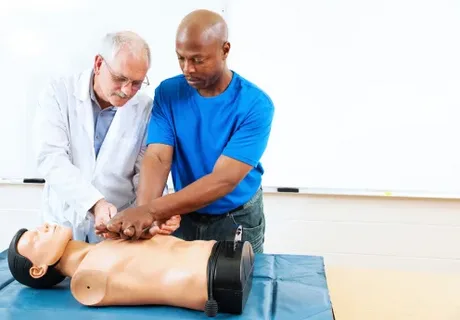While CPR is a vital life-saving skill, it’s not always appropriate to perform it in every emergency. In fact, there are certain situations where not performing CPR is the correct action—whether due to legal, ethical, or medical reasons. Understanding these scenarios is just as important as knowing how to perform CPR effectively.
Here are the top 5 cases where you should not perform CPR, explained in detail to help responders, caregivers, and even bystanders make informed decisions in high-pressure moments.
1. Obvious Signs of Irreversible Death
When someone shows unmistakable signs of irreversible death—such as rigor mortis (stiffening of the body), livor mortis (discoloration due to blood pooling), or decapitation—CPR is not only futile but also medically and ethically inappropriate.
Why not perform CPR?
- The heart has long since stopped.
- Tissues and organs have begun irreversible breakdown.
- No amount of compressions will restore function.
What to do instead?
Contact emergency services and do not disturb the scene unless necessary. These cases often fall under forensic investigation.
2. Presence of a Valid Do Not Resuscitate (DNR) Order
A Do Not Resuscitate (DNR) order is a legal document that expresses a patient’s wish to not receive CPR in the event of cardiac arrest. It is often part of end-of-life planning for individuals with terminal illnesses or severe health conditions.
Why not perform CPR?
- The person has made a documented and legally binding decision.
- Performing CPR violates their autonomy and healthcare directives.
What to do instead?
- Confirm the DNR is valid and available (bracelet, document, or notation in a care facility).
- Provide comfort care and emotional support until medical personnel arrive.
3. When the Scene Is Unsafe
Before initiating CPR, always assess your surroundings. If there are active dangers—like fire, toxic fumes, live electrical wires, or a violent individual—entering the scene puts your life at risk.
Why not perform CPR?
- You could become another victim.
- Emergency responders may be delayed in helping both you and the victim.
What to do instead?
- Call 911 and provide accurate information about the hazard.
- Wait for trained professionals with proper equipment to intervene.
4. Advanced Decomposition or Severe Trauma
If the person has clearly been deceased for a long period (evident by decay, missing limbs, or severe mutilation), CPR is not appropriate.
Why not perform CPR?
- There is no chance of reversing the biological damage.
- Initiating CPR in these cases serves no medical purpose.
What to do instead?
- Contact emergency services and secure the scene if needed.
- Prepare to give a detailed account for emergency or forensic personnel.
5. When CPR Could Cause More Harm Than Good
This is a nuanced situation. In some terminal cases—like end-stage cancer, severe cardiac disease, or advanced dementia—CPR may result in broken ribs, internal injuries, and prolonged suffering without meaningful recovery.
Why not perform CPR?
- The likelihood of restoring meaningful life is extremely low.
- The intervention may lead to prolonged suffering or invasive procedures the patient didn’t want.
What to do instead?
- Respect previously discussed care plans and consult with the family, if applicable.
- Focus on comfort and palliative care.
Conclusion
CPR is a powerful tool—but it’s not always the right one. In these five cases, not performing CPR is a decision grounded in respect for life, safety, and dignity. Knowing when not to act is a critical component of being a responsible and compassionate responder.









